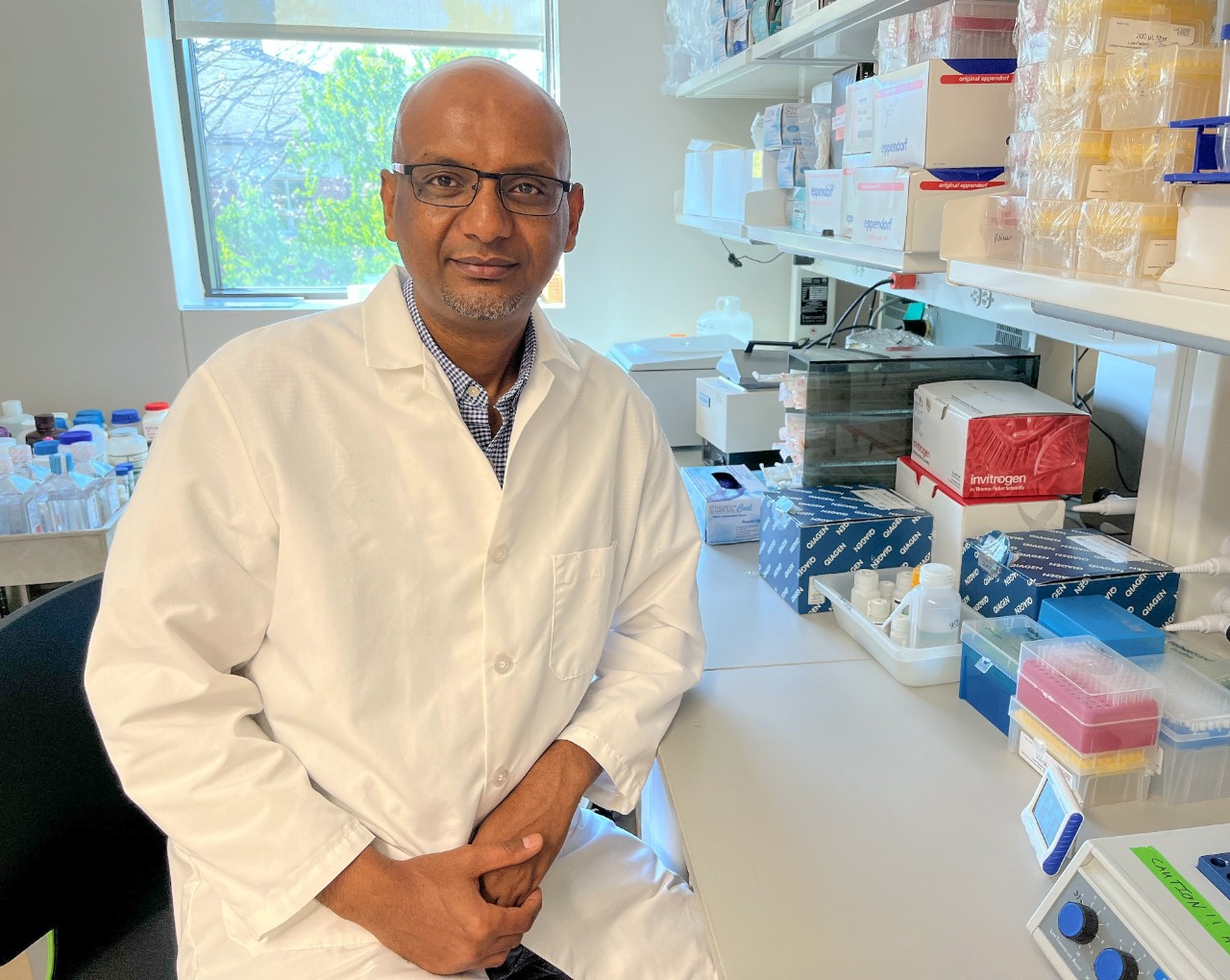
Category: Animal and Food Sciences

Meet our new faculty: Alexander Yitbarek
April 22, 2024 Written by Katie Peikes | Photo by Katie Peikes | Katie Peikes
The Delmarva Peninsula’s broiler chicken industry feeds the world. Just last year, the region’s poultry industry processed more than 4 billion pounds of chicken that made the way to restaurants, grocery stores and kitchen tables.
University of Delaware’s Alexander Yitbarek says as the world’s population continues to grow, people are turning to poultry as a critical source of protein to eat. Poultry contributed to 12.5% per capita of meat consumption in 1961 globally. By 2021, the number rocketed to 40%. Chickens produce fewer greenhouse gas emissions per kilogram of meat or per dozen eggs, require less land and water, and have higher feed conversion efficiency.
“We’re trying to make sure we have a large enough supply with minimal stress on the environment,” Yitbarek said. “We do this, of course, by raising healthy chickens, among other sustainability measures that put minimal stress on the environment.”
Yitbarek, who came to UD in January and is a new faculty member of the Department of Animal and Food Sciences, studies the health and biology of chickens. He researches the effects of various feed additives and nutrients on chickens’ health and performance. He also researches various diseases that affect chickens’ health, overall performance and welfare.
“If their gut is not healthy, they’re not able to convert the nutrients that they consume to protein,” Yitbarek said. “So we try to make sure that chickens have a healthy gut to ensure that they convert the nutrients from the feed that we give them.”
A chicken with an infection in its gut will use energy to get well, rather than using that energy to produce eggs or meat.
“You then have a compromised or imbalance of energy that goes to maintaining their health rather than going to production,” Yitbarek said. “You have more energy required to produce the meat and eggs that we want.”
The U.S. Food and Drug Administratrion’s Guidance for Industry #213, which came into effect on January 1, 2017, no longer permits livestock and poultry producers to use antibiotics as growth promoters. And antibiotics that are also used in human medicine must be prescribed by a veterinarian, for the sole purposes of addressing disease.
“While the poultry industry started implementing measures to reduce antibiotic use way ahead of the above guidance, we now have reemerging diseases because we used to control these diseases with in-feed antibiotics,” Yitbarek said.
That’s where Yitbarek’s research comes in. He works to find alternatives to antibiotics that can keep a chicken’s gut healthy. Natural alternatives, such as probiotics, prebiotics, phytogenics and others.
“We try to see if we can make the gut healthy, kind of replacing antibiotics,” Yitbarek said.
Yitbarek is designing a course called Gut Health of Domestic Animals (ANFS 467/667) to teach students about what goes on in a chicken’s gut. The course will cover things like how a chicken’s gut absorbs nutrients, what type of infections can compromise gut health, how the chicken responds to the infection, and how the host interacts with the beneficial microbes in the gut.
In addition to his work on chicken gut health,Yitbarek also researches vaccines to protect poultry against viral and bacterial diseases.
Highly pathogenic avian influenza, commonly known as bird flu, is highly contagious and deadly. Even if one chicken in a flock tests positive for it, the entire flock needs to be destroyed to keep the virus from spreading. An ongoing outbreak of bird flu in the U.S. began in 2022 and has affected more than 82 million birds that have died or been killed to keep the virus at bay. The outbreak has been attributed to wild birds that can carry the virus and shed it through their excrement or saliva.
The U.S. Department of Agriculture is working to identify vaccines for the current strain of bird flu that it could distribute to commercial poultry. Yitbarek said the next-generation vaccine technologies such as the one used to make vaccines that protect people against COVID-19 could have a similar application for bird flu.
“We want to bring that technology to the poultry industry as well,” he said. “In addition to inactivated, live-attenuated and recombinant vaccine platforms, our lab is interested in utilizing next-generation vaccine platforms such as vector- and nucleotide-based vaccine technologies.”
Yitbarek said he was drawn to UD and the College of Agriculture and Natural Resources because of its focus on poultry — Delaware’s top agricultural sector. On its Newark campus, the University boasts Charles C. Allen Jr. Biotechnology Laboratory, a world-class facility that researches and diagnoses poultry diseases. And in Georgetown, the University has Lasher Laboratory which can rapidly test and diagnose chickens for diseases. Allen Lab, in particular, has a status of biosafety level 3 which means it works with more dangerous pathogens. The world class lab continues to draw prominent researchers to UD.
“To have this lab within walking distance is not something you see often on a college campus,” Yitbarek said.
